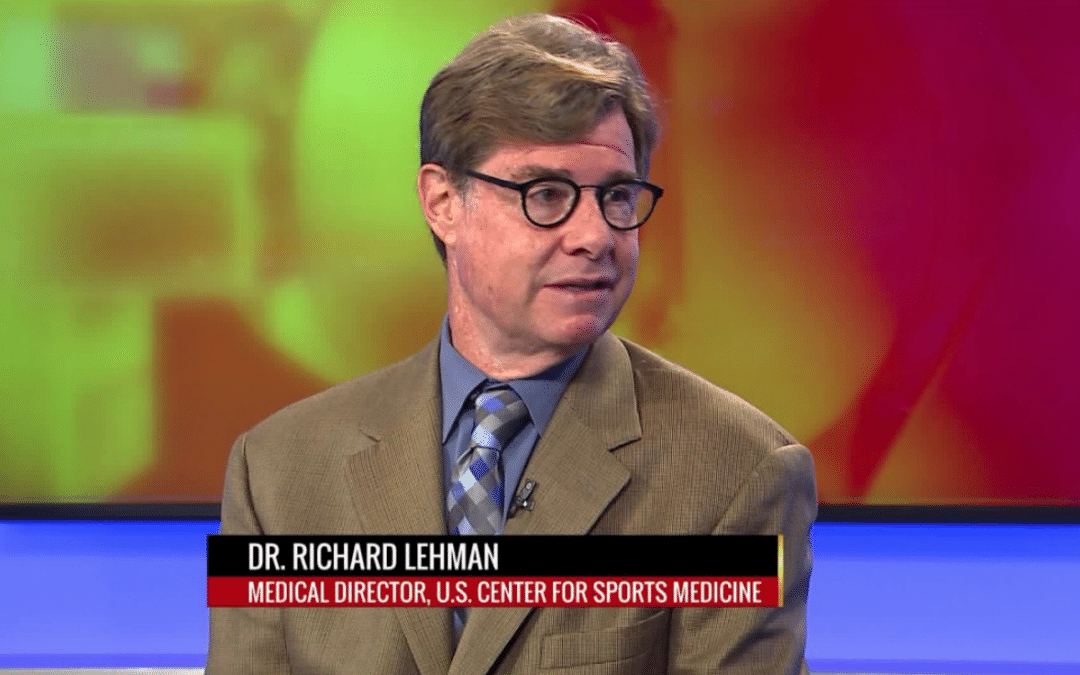As one of the most celebrated orthopedic surgeons in the sports medicine industry, the list of Dr. Richard Lehman’s accolades is extensive. Most notably, he spearheaded a procedure for articular cartilage reconstruction, has worked as the team physician for multiple professional organizations across various sports, and has served as a physician for four Olympic Games among other remarkable accomplishments.
Now residing in Kirkwood, Missouri as the founder and medical director of the U.S. Center for Sports Medicine, Dr. Lehman recalls a much different childhood dream. As young boy in Miami, Florida, Dr. Lehman aspired to become a professional tennis player. He went on to earn a tennis scholarship at the University of Minnesota, but quickly learned that a professional career simply was not in the cards.
“I wasn’t good enough to play professionally, so I said I’ve got to go back to school and get a job,” Dr. Lehman recounted. “I ended up going to medical school because I figured if I was going to get a job, I better get a good one.” While medical school certainly was not easy, the decision to pursue sports medicine was.
“When I was in medical school, the only thing that seemed logical was to do sports medicine because I always just really wanted to play tennis,” said Dr. Lehman. “Orthopedics and sports medicine were the closest things to playing tennis that I could do. I realized that I could relate to athletes better than I could relate to doctors, and it just made sense.”
Dr. Lehman credits his time as a student-athlete at the University of Minnesota for his ability to truly understand what his patients are going through. “When you think like an athlete, you can look at each situation like they do as opposed to how an outsider would,” Dr. Lehman explained. “I think my time at Minnesota made me relate more with the athletes, as opposed to a doctor who isn’t an athlete and doesn’t understand the significance of whether or not the kids are able to come back.”
The massive success that the athletes under Dr. Lehman’s care have had undoubtedly demonstrates this unique ability to relate. Dr. Lehman treated football players Jerome Bettis and Ty Law, who each went on to win the Super Bowl after treatment, as well as numerous track and field athletes who overcame injury to win Olympic gold medals. According to Dr. Lehman, “There’s nothing better than watching athletes perform at a high level after you take care of them.”
Dr. Lehman also stresses the importance of listening when helping athletes return to high-level performance. “Athletes know their bodies pretty well,” said Dr. Lehman. “I think one thing I’ve learned is that you have to really listen to what they tell you – maybe that comes from my background as a tennis player.”
This tennis background has inspired Dr. Lehman to author three books on tennis injuries. According to Dr. Lehman, the top way to prevent injuries in tennis is to limit abnormal stress on the body by practicing proper technique. He also noted the importance of recovery for optimum performance, stating that the key to success is teaching athletes the balance between intense workouts and intense recovery. When recovering from an injury, Dr. Lehman stressed the significance of active recovery through cross-training, and above all, patience.
With such extensive knowledge on the potential dangers and injuries involved in sport, one cannot help but wonder if Dr. Lehman felt particular apprehension when watching his two daughters – who each competed at the collegiate level – play tennis.
Dr. Lehman recalls finding it difficult to watch his daughters play tennis at a high-level, but not for fear of injury. He was just like any other parent who wanted to see his children perform at their best, which is why he always encouraged his daughters to play tennis.
“Tennis is a great sport,” he stated. “It’s something that you can play for the rest of your life. The injury rate is low compared to other sports like soccer and basketball. It’s a social sport, you don’t have to be the most amazing athlete in the world to be a decent tennis player. There’s a lot of reasons why I think tennis is a great sport for kids.”
Of all the reasons why tennis is a great sport, Dr. Lehman firmly believes that the valuable life lessons that you can learn are the most important. First, he spoke about the sense of achievement that both he and his daughters learned through the sport. “If you get to the level that my daughters and I played, you feel like you can do anything,” he said. “You really have a sense of accomplishment. You walk away and say, ‘Wow, if I can do this, anything else is pretty doable.’”
Along with confidence is drive and determination. “Tennis also teaches perseverance,” said Dr. Lehman. “You’re not going to have many days where you walk away and think, ‘Wow, I played amazing today.’ Tennis teaches you to keep going, keep working harder, and I think that’s an incredibly valuable life lesson.”
At the WTCA, we believe that tennis teaches girls so much more than just how to hit a ball. The sport teaches these same life lessons that Dr. Lehman touched on, such as commitment, perseverance, strength, and grit. Join us and Dr. Lehman at the WTCA Conference in NYC to learn how your female athletes can use to qualities to excel in all aspects of their lives.

